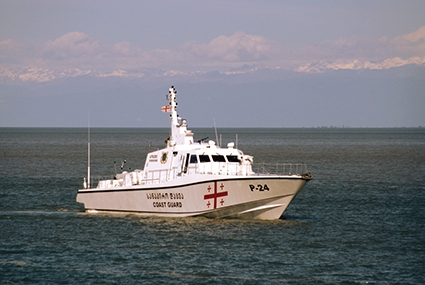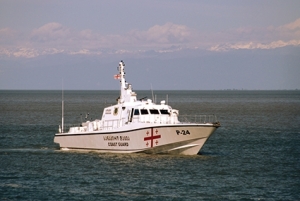Georgia’s Non-Existent Navy
NATO Secretary General Jens Stoltenberg said after a February meeting of the ministers of defense, that six NATO members – Canada, Germany, The Netherlands, Poland, Turkey and the US – have “indicated their willingness to contribute to our presence in the Black Sea region, on land, at sea and in the air. Other Allies are also looking into how they can contribute.” It remains to be seen what exactly “willingness to contribute” is likely to entail.
Two countries in the Black Sea region, Georgia and Ukraine, that aspire to become NATO members in the foreseeable future, are different in terms of naval capabilities and their potential contribution. For instance, the Ukrainian Navy commissioned two GURZA-M missile-capable patrol boats on 6 December 2016. Furthermore, Oleksandr Turchynov, Secretary of the Ukrainian National Security and Defense Council (NSDC), said on 30 November 2016: even though “we do not have many ships, we are ready to participate in joint projects, such as joint patrols.”
Mikheil Janelidze, Georgian Minister of Foreign Affairs, was rather diplomatic in saying on October 27, 2016: “Georgia participates in the NATO discussions regarding the Black Sea security in all relevant formats.”
It should be stressed that Georgia lacks serious naval capabilities aside from a small number of Coast Guard ships, while, besides the Crimean Peninsula, Russia also holds a naval base in Ochamchira, Abkhazia (part of Georgia) from where it dominates the Black Sea all the way to the Turkish border.
As expected, Russia has strenuously objected to NATO’s already heightened activity in the Black Sea. Sergei Lavrov, Russian Minister of Foreign Affairs, said in mid-December 2016 that “we perceive the proposed Ukrainian and Romanian idea to create a permanent active NATO Group in the Black Sea as provocation.”
The fact that Russia has responded to NATO's decision by strengthening its position in the Black Sea, with Russia’s rearmament and an expanded range of exercises and naval patrols, is not considered provocation by Lavrov but rather business as usual. Thus, it can be said that Russia is indeed interested in reducing NATO's influence in the region by all available means, including military.
The latter point can no longer be disregarded. As presented above, the balance of power in the region has shifted in favor of Russia, while NATO actions in the region are as usual coming late but fortunately not too late for the countries in the region.
Still, NATO involvement comes with rather limited actions such as the creation of a multinational naval brigade of about 5,000 soldiers. Nikolai Nenchev, Bulgarian Minister of Defense, said on October 26, 2016, that, “Sofia and Bucharest would work together and define their takes on the increased NATO deployment in the Black Sea by December.” December is gone and no joint definition of the two countries has been reached, since in early January 2017, a new government in Romania was inaugurated, while the current government in Bulgaria remains an interim government with elections due in spring.
Nevertheless, Bulgaria has agreed to participate with 400 soldiers in a multinational brigade in Romania.
Klaus Iohannis, President of Romania, said on September 27, 2016: “We believe that during 2017 we will be in a situation to declare our initial capacity for the multinational brigade and at an optimistic estimate, that brigade will be functional in 2018.”
Whether or not NATO’s limited actions in the Black Sea region will deter Russian hostile actions against NATO member states or NATO partners, such as Georgia and Ukraine, remains to be seen. At least, after initial hesitance, NATO, prodded by Romania, decided to step in. The end result of NATO stepping in remains to be seen.
Eugene Kogan












